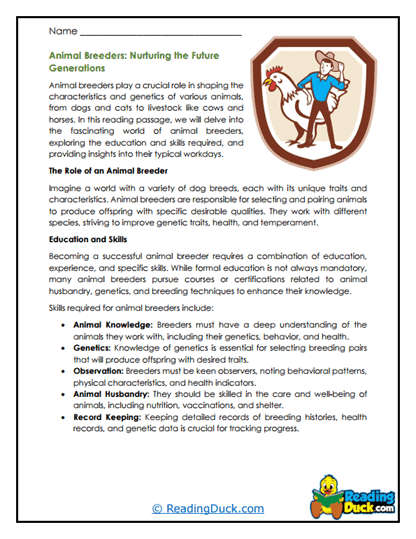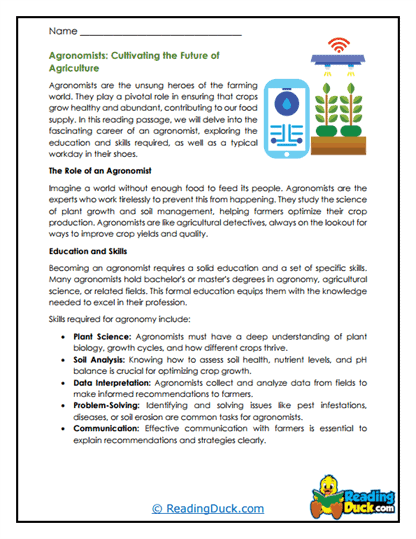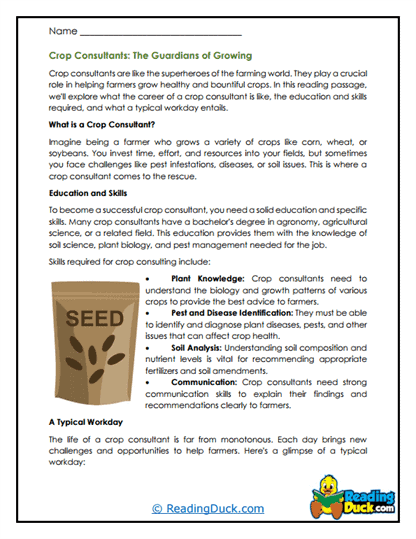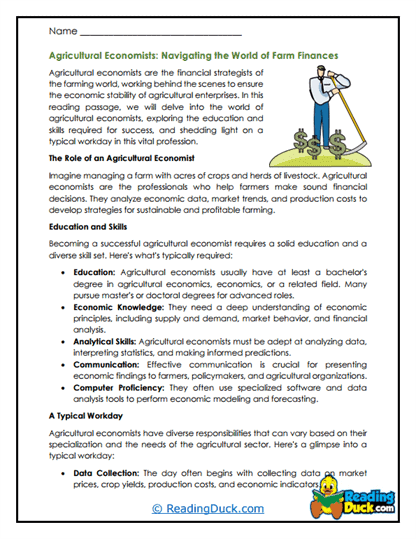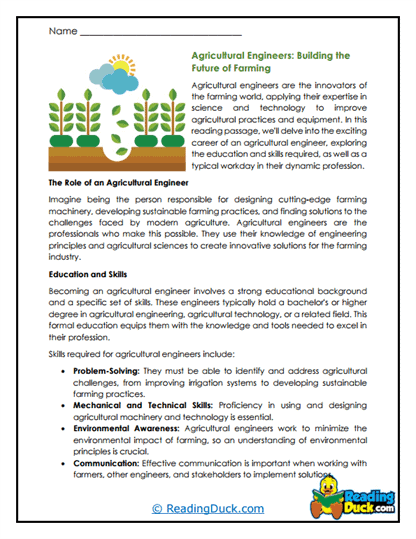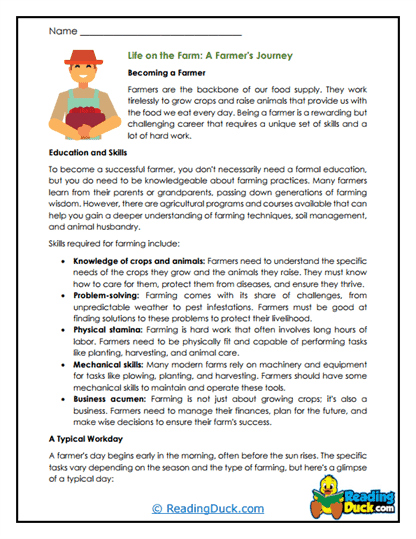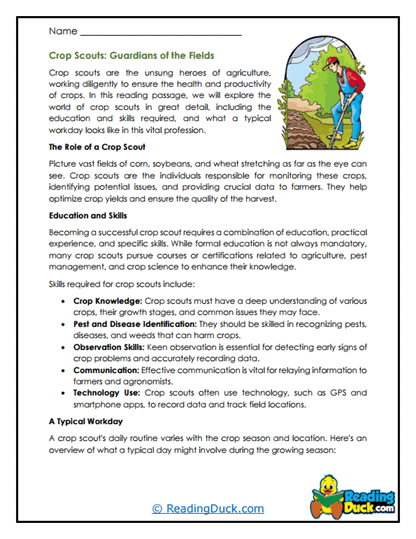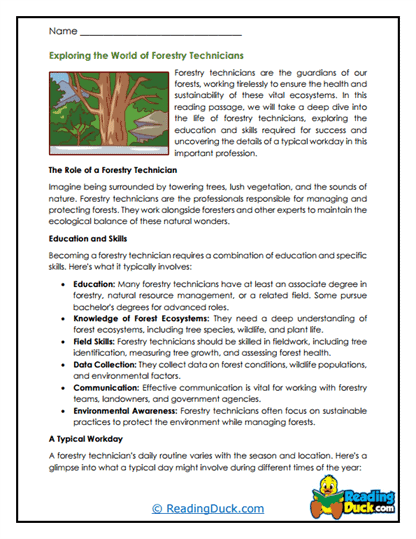Careers in Agriculture Worksheets
About Our Careers in Agriculture Worksheets
Our Careers in Agriculture Worksheets offer students a comprehensive look into the diverse and essential field of agriculture. These worksheets are designed to introduce students to various careers within agriculture, from traditional farming and livestock management to modern agricultural technology and sustainability practices.
This topic contains several worksheet sets, each focusing on a specific aspect of agriculture. Each worksheet set includes:
- Multiple Choice Questions: These questions assess students' comprehension of the reading passages, focusing on key details about the careers, necessary skills, and educational requirements in agriculture.
- Short Answer Questions: Students are prompted to provide concise responses, summarizing important information, analyzing the roles and impact of different agricultural careers, and reflecting on the relevance of agriculture in their own lives.
- Open-Ended Questions: These questions encourage students to think critically and express their personal interpretations, opinions, and preferences related to the agricultural topics they have read about, fostering a deeper connection to the subject matter.
These worksheets are designed to help students demonstrate their understanding of agricultural careers while fostering meaningful engagement with the diverse opportunities in this field. An answer key is provided for each question sheet, making it easy for teachers and parents to evaluate student progress. The worksheets are available in PDF format, ensuring they can be easily viewed electronically, downloaded, and printed.
Exploring the World of Agriculture: Careers that Nourish the Future
Agriculture is a dynamic and essential industry that touches nearly every aspect of our daily lives, from the food we eat to the clothes we wear. The field of agriculture encompasses a wide range of careers, each contributing to the growth, development, and sustainability of our global food systems. Understanding careers in agriculture allows students to see the critical role this industry plays in feeding the world, preserving the environment, and driving economic growth. By exploring these careers, students can gain a multi-faceted understanding of the opportunities available and how they might find their place in this vital sector.
Students exploring careers in agriculture will delve into several key aspects:
- Diverse Career Opportunities: The agricultural sector offers an expansive range of careers, each with unique challenges and rewards. Students will learn about roles such as agricultural engineers, who design and develop machinery and processes to improve farming efficiency; agronomists, who study soil and crops to enhance food production; and food scientists, who work on developing and testing new food products. Additionally, they will explore emerging careers in sustainable agriculture, organic farming, and agri-business, where innovation and sustainability are at the forefront. Understanding the variety of careers in agriculture helps students see the broad spectrum of possibilities within this industry, from hands-on farming to high-tech research and development.
- Educational Pathways and Skill Development: A successful career in agriculture often requires specialized education and training. Students will explore the different educational pathways available, ranging from vocational training and apprenticeships to advanced degrees in agricultural sciences, environmental studies, and business management. They will also learn about the essential skills needed in agriculture, such as problem-solving, critical thinking, technical expertise, and a strong understanding of biology and environmental science. By understanding these pathways, students can better plan their educational journeys and career goals within the agricultural sector.
- Technological Advancements in Agriculture: Modern agriculture is increasingly driven by technological innovation. Students will explore how advancements such as precision agriculture, genetic engineering, and data analytics are revolutionizing the industry. They will learn about the role of technology in improving crop yields, reducing environmental impact, and making farming more efficient. This section will also introduce students to careers that intersect with technology, such as agricultural technologists, who work with drones and GPS systems to monitor and manage agricultural activities. By studying these advancements, students can appreciate the importance of staying current with technological trends and their applications in agriculture.
- Sustainability and Environmental Stewardship: As the world faces environmental challenges such as climate change, water scarcity, and soil degradation, sustainability has become a key focus in agriculture. Students will investigate careers that emphasize sustainable farming practices, conservation, and environmental management. They will learn about the importance of balancing productivity with ecological responsibility, exploring careers such as conservation scientists, who work to protect natural resources, and sustainable agriculture specialists, who promote practices that reduce environmental impact. Understanding the role of sustainability in agriculture helps students recognize the industry’s responsibility to future generations and the planet.
- Global and Local Perspectives: Agriculture operates on both a global and local scale, impacting communities around the world. Students will explore how agricultural careers affect local economies and food systems, such as through community-supported agriculture (CSA) programs, urban farming, and regional food distribution networks. They will also consider the global dimensions of agriculture, including international trade, food security, and the role of agriculture in economic development in different parts of the world. By understanding these perspectives, students can appreciate the interconnectedness of agriculture with global and local economies and communities.
- Innovation and Entrepreneurship in Agriculture: The field of agriculture is ripe with opportunities for innovation and entrepreneurship. Students will explore how individuals and companies are creating new products, services, and business models within the agricultural sector. They will learn about the challenges and rewards of starting an agricultural business, from farm-to-table enterprises to agricultural technology startups. This exploration encourages students to think creatively about how they might contribute to the future of agriculture through innovative thinking and entrepreneurial endeavors.
Through the study of careers in agriculture, students will gain a comprehensive understanding of the opportunities available in this field, the importance of agriculture in our daily lives, and the skills and knowledge required to succeed in an agricultural career.
Integration of These Worksheets In A Learning Curriculum
Integrating the study of careers in agriculture into a learning curriculum can provide students with valuable insights and practical knowledge that extend beyond the classroom. Here are some practical ideas for using these worksheets in various subjects:
- Science Classes: Use the worksheets in conjunction with biology, environmental science, or earth science lessons to help students understand the scientific principles that underpin agricultural practices. For example, students can learn about plant biology in relation to crop production, or study soil science to understand its role in sustainable farming.
- Social Studies and Economics: Incorporate the worksheets into social studies or economics classes to explore the economic impact of agriculture on local and global scales. Students can analyze the role of agriculture in economic development, trade, and food security, or investigate the social and cultural significance of agricultural practices in different regions.
- Career and Technical Education (CTE): Integrate the worksheets into CTE courses focused on agriculture, food, and natural resources. These worksheets can help students explore specific career paths within the agricultural sector, understand the skills required, and plan their educational and career goals accordingly.
- Business and Entrepreneurship: Use the worksheets in business or entrepreneurship classes to inspire students to think about agricultural business opportunities. Students can develop business plans for agricultural startups, explore the financial aspects of running a farm, or learn about marketing and distribution strategies in the agri-business sector.
- Interdisciplinary Projects: Encourage students to participate in interdisciplinary projects that combine science, technology, and social studies with agricultural themes. For example, students can work on a project to design a sustainable urban farm, create a business plan for a local food market, or develop a proposal for reducing food waste in their community.
- Field Trips and Guest Speakers: Enhance the learning experience by organizing field trips to local farms, agricultural research centers, or food processing facilities. Additionally, invite guest speakers from various agricultural careers to share their experiences and insights with students.
- Hands-On Activities: Complement the worksheets with hands-on activities such as starting a school garden, participating in a community-supported agriculture program, or conducting experiments related to soil health, plant growth, or water conservation.
Studying careers in agriculture through these worksheets can significantly enhance students' critical thinking, problem-solving, and analytical skills. By exploring the diverse opportunities within agriculture, students develop a greater appreciation for the vital role this industry plays in society and the environment. These skills not only contribute to academic success but also prepare students for informed decision-making and potential future careers in this essential field. Encouraging curiosity and interest in agriculture can lead to a lifelong appreciation for the industry and its impact on our world.
